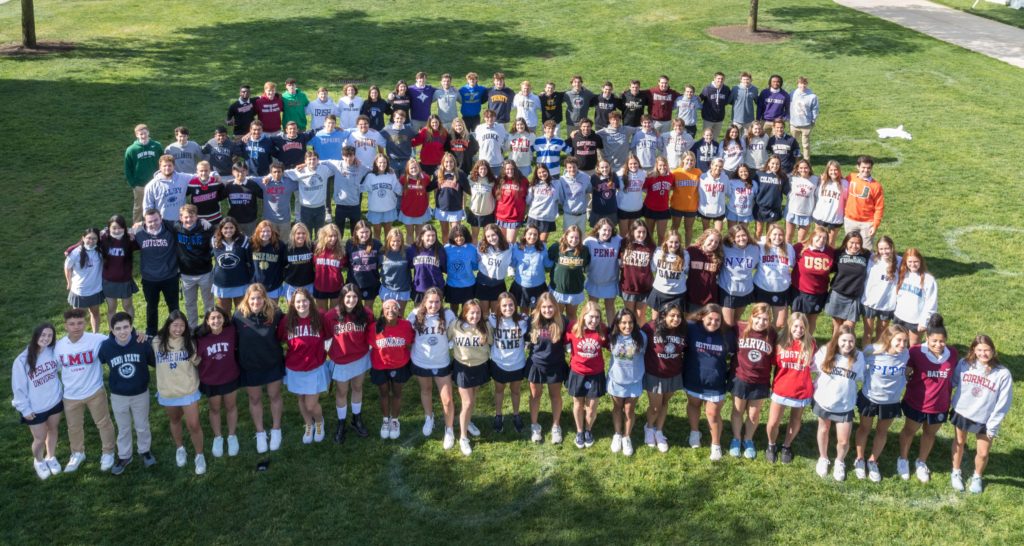Alexandra Gobran ‘23
Starting in freshman year, Episcopal works to equip the Upper School Student Body with the skills and experiences necessary for success when they leave for college. As recently-graduated alumni reflect on their current situations in college, they reveal what the environment and curriculum at EA did the best job preparing them for, and what they wish they had received more direction or understanding of before going to college.

Photo courtesy of Episcopal Communications
Several alumni share the sentiment that the rigor of Episcopal’s course load enabled them to develop time-management skills that have helped them in college. Cathy Wang ‘17, who attended Penn State, says. “EA has taught me how to better manage my time so that when I went to college, I had less of a struggle than perhaps other students who might have had to learn how to balance challenging classes and all the work that comes with a heavy course load.”
In addition to teaching students how to effectively allocate time for their courses, Episcopal also helps students to understand how to balance their schedules between academics and athletics. Ashley Lederman ‘21, a field hockey student athlete at MIT, notes, “I think that EA did the best job preparing me for time management between sports and school. I am very used to having to plan ahead now and stay on top of things.”
Freshman at The University of Notre Dame, Kathleen Mark ’21 explains that in addition to helping kids learn time management skills, the courses Episcopal offers are also helpful. She states, “I think EA help allows students to explore a myriad of areas that other highschools don’t.”
Michael Gobran ‘21 also believes that the diversity of courses students have the chance to take during their time in high school at EA played a significant role in preparing him for college. He comments, “At EA, I was exposed to a lot of different classes in a bunch of different areas–sometimes the classes were a requirement and other times we had the choice. I mean I took everything from Improv to Statistics. This gave me a way to explore my interests and gave me a glimpse into the vast swathe of things I could study in college.”
However, while a broad range of courses may be available at Episcopal, some students were not always exposed to all of the different types of classes. Lederman explains, “I wish I knew how to code before college. I think that the recent update to the curriculum–the requirement that students must take a computer science course–will be super beneficial in college.” Episcopal’s mandatory classes were changed before the current juniors entered highschool, so all students are now required to take a computer science class during their time in high school.
The nature of the classes at Episcopal also provides students with valuable insight into what they might experience with the rigor of courses in college. Joey Dugery ‘19, a Junior at Richmond, remarks, “EA does a good job of preparing us for the workload of college by having an enriching and challenging curriculum that requires deep analytical and critical thinking.”
Lederman agrees, and adds that the material covered in Episcopal classes was also valuable. She says, “I think that AP Stat may have been the most helpful class I took, which I did not expect at all. The information and ideas that I learned from that class have shown up in some of the current classes that I’m taking–like Calc and Psych–and it’s been really helpful coming in with the general material that has been covered.”
However, while many alumni have found that the course load and breadth of information taught in classes are useful, some feel that the environment at Episcopal did not prepare them for what the peer-to-peer dynamic is like at their colleges. Gobran shares, “I always felt like the situation at EA was really cutthroat, and everybody was super high-strung about getting perfect grades. My experience at BU–and I’m not saying that everyone’s college experiences are like this–has been different because it feels like there is less tension between me and my classmates over things like grades.” He continues, “I wish EA would have taught me that school doesn’t have to be cutthroat for you to learn. I think that I could have been better prepared if I went in with the mentality that I could work with my peers rather than against them.”
Chris Lo ‘21, a freshman at Johns Hopkins University, shares a similar sentiment with Gobran. He explains his experience, saying, “At college, I work a lot in peer study groups and we collaborate and study together. Working with my friends who are also in my major is super helpful because we’re all studying the same material but can explain it to each other in a more understandable format. We support each other and want everyone to succeed in the classes we’re taking. This is pretty different from EA where I feel like there was a little bit more of an individualistic mindset.”
As seniors prepare to enter college, there is frequently anxiety about whether or not they are prepared for the next four years. Mark, however, reassures that EA will have taught them the skills they will need for the future. She comments, “My advice to the seniors is to relax and remember that everyone ends up in the right place. Trust the things that you are learning at EA, socially and academically, have prepared you beyond the average student you will encounter in college.”